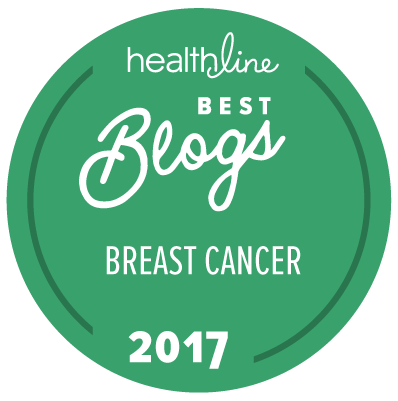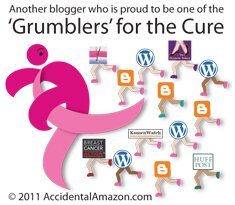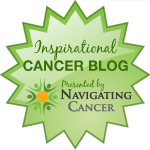Why Am I So Tired? A Primer on Breast Cancer and Fatigue
 About seven months ago, I started dealing with a serious health crisis that wasn’t cancer. Three of the disks in my neck were bulging and compressing my spinal cord, leaving me with neuropathy in both hands, weakness everywhere, decreased balance and coordination, and increased muscle pain and spasms. I couldn’t hold small objects or feel my patients’ pulses. I couldn’t carry my work bag over my shoulder by the strap. I had to start using a cane to walk. Because I’m a physical therapist, I knew that if I didn’t do something soon, I would not be able to continue performing my job. In April, I had surgery to remove the three bulging disks and to stabilize those three levels in my neck with hardware and bone graft material. I was out of work for nine weeks altogether, and recently returned, feeling very fortunate that I was able to do so.
About seven months ago, I started dealing with a serious health crisis that wasn’t cancer. Three of the disks in my neck were bulging and compressing my spinal cord, leaving me with neuropathy in both hands, weakness everywhere, decreased balance and coordination, and increased muscle pain and spasms. I couldn’t hold small objects or feel my patients’ pulses. I couldn’t carry my work bag over my shoulder by the strap. I had to start using a cane to walk. Because I’m a physical therapist, I knew that if I didn’t do something soon, I would not be able to continue performing my job. In April, I had surgery to remove the three bulging disks and to stabilize those three levels in my neck with hardware and bone graft material. I was out of work for nine weeks altogether, and recently returned, feeling very fortunate that I was able to do so.
Naturally, I thought of my last serious health crisis, which was breast cancer. Next month, it will have been nine years since I was told my biopsy was positive. My neck surgery was a lot more brutal than my partial mastectomy, and a lot harder to recover from. But I didn’t have to endure radiation and Tamoxifen after it. I was exhausted and miserable after neck surgery, but I couldn’t help noticing that ultimately, I felt better than I did before my symptoms started. I certainly cannot say the same about cancer. I still remember what I dynamo I was back then before I was diagnosed, and how, nine years later, I have not fully shaken the effects of the fatigue that moved in and never entirely left me. But I have learned a lot about it, and yes, I do feel a lot better than I did when it started. A lot better. So, it seemed like a good time to write about it once again.
I don’t have a magic spell to offer you about how to make fatigue disappear. But I can tell you a few really good things. Since I first started trying to figure it out back in 2008, the chronic, long-term, body-slamming fatigue that results from cancer and cancer treatment has been formally recognized and given a nice, logical name — cancer-related fatigue, or CRF. There has been a great deal of research on it, verifying its existence, its prevalence, and its biomarkers, and studying various treatments for it. Assessment tools have been developed for it, so that doctors can officially evaluate and diagnose it. And it has even been given its own ICD10 code so that insurances will pay for treating it. One thing that has not changed is that it still happens. Without a doubt, CRF has been one of the most onerous, long-lasting consequences of cancer and cancer treatment for me personally, and for many, many other cancer patients. So, here’s an updated primer that may help.
What is this and why is it happening to me?
As soon as you hear that you have breast cancer, or almost any kind of cancer, your body starts reacting to the awful news. You may feel shock and disbelief. You may have dozens of questions. Your life starts to include a flurry of diagnostic tests and doctor visits. You have to find babysitters, take time out of work, deal with insurance claims, figure out if you can afford co-pays. Your body goes into high-stress mode. Stress has an immediate effect on your emotions, as well as wreaking havoc on the neurotransmitters and hormones that manage your state of mind, your sleep, and your energy. Most likely, your immune system has already been attempting to deal with the cancer cells in your body, long before you are aware of it, and now it has to deal with the physical consequences of uncomfortable tests and biopsies. Your concentration can be adversely affected, and you may find that you are too tired and frantic to deal with ordinary household tasks. And this is just the beginning. Before you even contemplate surgery, radiation, or chemotherapy, you may feel exhausted.
Each step of the treatment path for breast cancer can add to your fatigue. Surgery is often the first step, and depending on your tumor and the options you choose, may involve more than one type of surgery, and more than one protracted period of recovery. If you opt for radiation, it is usually scheduled within weeks of your initial surgery, and can require daily treatment sessions over several weeks. Chemotherapy, by infusion or by oral medications, may require months or even years to receive. If you are diagnosed with de novo metastatic breast cancer, your treatment will never end.
The side effects of each of these treatments can take a huge toll on your stamina. Meanwhile, your life is turned upside down. You may have to miss a lot of work, or not be able to work at all. Your bank account may shrink drastically, and you may need help from others who may not be used to providing care. Is it any wonder that, along with scars, treatment side effects, and anxiety, so many of us develop overwhelming and long-lasting fatigue?
According to a 2013 article, originally published in Brain, Behavior, and Immunity, “Fatigue is one of the most common and distressing side effects of cancer and its treatment, and may persist for years after treatment completion in otherwise healthy survivors.” It has been estimated that from one quarter to nearly all cancer patients experience fatigue during and after treatment. We may be warned about fatigue beforehand, but often these warnings do not begin to encompass the totality of its effect on us and our quality of life.
What is cancer-related fatigue?
Cancer-related fatigue (CRF) is a condition that researchers are still trying to understand. It is not simple tiredness that can be fixed by an extra nap or two. CRF is a persistent, whole-body exhaustion that you can’t ignore. You may sleep for hours every day, yet not feel refreshed or energized by that sleep. You may find it hard to concentrate or to engage in your usual activities. Although in itself, CRF is not the same as depression, you may also find that it affects your mood, as you struggle with or are unable to do the things you want or need to do.
Although CRF exists as a separate issue, there are a number of other physical and psychological factors that may contribute to fatigue. These need to be addressed separately. They include pain; nausea and diarrhea that can lead to dehydration; poor thyroid function; lowered red or white blood cell counts; menopausal symptoms brought on by surgery or chemotherapy; fever and infections; nutritional imbalance; anxiety and depression; and the sedating side effects of medications for pain or anxiety. The decreased activity brought about by fatigue can also make it worse.
A thorough evaluation of your symptoms should be done. This may be carried out by your oncologist or by your primary care physician. And don’t let your doctors brush you off with the usual bromides that you’ll be fine with more rest and more exercise. You need a proper assessment. One of the problems that cancer patients can encounter when trying to get help is that their doctors don’t really know how to assess them for this kind of fatigue. I had to dig up my own information and ultimately find a research study nearby that was able to assess my fatigue and help me get treatment for it. If need be, don’t hesitate to refer your doctor to this link at the National Cancer Institute website that describes CRF in detail, as well as how to assess and treat it.
A number of survey tools have been developed and researched to assess CRF. One of them, called the Fatigue Symptom Inventory, has been found to be consistently reliable. It is a survey that you fill out yourself, and may fill out again from time to time, to see if your symptoms are improving. It can be found and downloaded at this link: Fatigue Symptom Inventory. Don’t be shy about providing your doctor with a copy of it for your chart.
What can I do about CRF?
Before you can address CRF specifically, you need to be treated for any of the other medical issues your doctor may identify when you are evaluated. For example, if you are anemic, you may need to take nutritional supplements like iron or get advice about how to improve your diet to build up your red blood cells. Some cancer patients may need specific medications or even a blood transfusion, and their blood levels will need to be monitored.
Sometimes fatigue is confused with depression. It’s important, therefore, to be evaluated to distinguish between the two. You may experience one or the other, or both at once. But they are not the same. Depression is a mood disorder that usually includes feelings of despair or hopelessness, apathy or lethargy, a desire to isolate yourself, and an inability to feel pleasure in activities that you usually enjoy. Depression can be relieved with medications that help improve the levels of neurotransmitters effecting your state of mind. You may need treatment for depression before you can adequately deal with your fatigue. A link to a previous post about depression and cancer is here: Depression and Cancer: An Insider’s View
Once you have addressed any contributing medical issues, there are a number of strategies that you can try to help your fatigue. Learning to prioritize the things you need to do, and to map out a reasonable schedule, can make life more manageable. It’s hard to ask for help, but this is the time to do it. If your friends or family members ask you to call them if you need something, see if you can make a list of things that need doing, and give them a task. Oncology counselors and nurse navigators, or local cancer support groups, can help you identify sources of help, often at no cost, to get things done. You may need others to babysit, take care of your pets, do the grocery shopping and prepare meals, clean your house, or mow the lawn. If you are able to work, you may be able to do some of your job at home. You may also be able to arrange for shorter work hours. It may be hard just to organize all this, so ask someone to help you with that, too.
Cancer patients are often advised about getting exercise. Exercise can help relieve fatigue, but doing it may seem like an impossible task when you have CRF. As a physical therapist, I try to give my cancer patients various options that address differing levels of energy, from short movement routines that they can perform lying down, to carefully progressive walking routines. Sometimes, you will feel like you can barely get out of bed. It’s often not helpful to be given a complicated routine that you cannot easily complete on your own. The best exercise advice is to keep it simple. Even if all you can do is to walk around your house or down your driveway for five minutes, that will help. Some cancer patients find it useful to join an exercise group for cancer patients at a local gym or to practice yoga. You can try out different activities to see what works for you. Keep in mind, however, that many of your daily activities can also provide some exercise. Tasks like sweeping the floor or doing your laundry involve exertion and weight-bearing that can keep you moving. Make sure you keep periods of exertion short, and get at least some brief, quiet rest afterward. Your doctor may be able to refer you to a rehab therapist for help and advice. You may find a few suggestions here to help get you started: Exercise After Cancer When You Don’t Feel Like It
If you still find it hard to get CRF out of your way, you may want to ask your doctor about neurostimulant medications. Many cancer patients are able to take medications like Provigil, Nuvigil or Dexedrine to help their concentration and energy last longer. For more details about CRF and its treatment, you can refer to the complete PDQ on Cancer-Related Fatigue provided by the National Cancer Institute. The section on Psychostimulants will tell you more about these medications. I found Provigil very helpful for getting through my work day. I also found time-released Wellbutrin, aka Buproprion, an older, dopamine-facilitating anti-depressant, to be helpful, and still take it sometimes as needed. It has its own link in the PDQ.
Most of all, remember that if you have CRF that lasts for months or even years, you’re not crazy or abnormal, and you’re not alone. If you need some validation, just type “fatigue” in the search box on my sidebar, and you’ll find the fifty-eight other posts I’ve written about it. Here’s a link to one, prompted by an article headlined, “Breast Cancer Fatigue is Real,” that also has several other links to helpful information: Could Have Told You That.
Here are a few other research links you may find helpful:
1) I’m So Tired: Biological and Genetic Mechanisms of Cancer-related Fatigue
2) Inflammation and cancer-related fatigue: Mechanisms, contributing factors, and treatment implications












